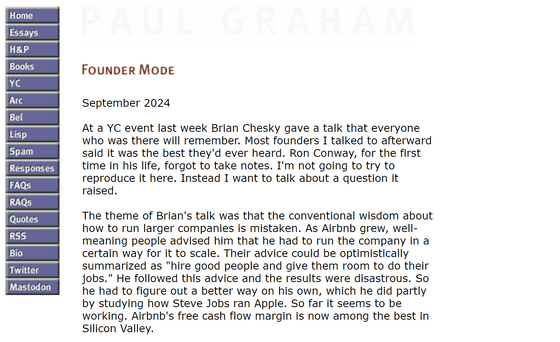Y Combinator founder Paul Graham says founders should run their companies in 'founder mode'

Paul Graham, founder of Y Combinator, a venture capital firm that invests in startups such as Dropbox and Airbnb, posted a blog post about 'founder mode.'
Founder Mode

Graham said he came up with the idea of 'founder mode' after listening to a lecture by Brian Chesky, founder of Airbnb. Chesky's lecture was about how 'the conventional wisdom about how to run a big company is wrong.' As Airbnb grew, people around him advised him to 'hire good people and give them the space to work,' but when he followed this advice, the results were disastrous.
The audience for Chesky's talk included many successful founders who said the same thing had happened to them: They had been given advice on how to run their companies as they grew, but that advice had harmed their companies.
Of course, the people around him were not trying to ruin the company with malicious intent, and their advice was well-intentioned. After thinking about why people around him gave him the wrong advice, Graham realized that they were telling him how to run a company founded by someone else, that is, how to run a company as a professional manager.
Graham says there are two ways to run a company: 'manager mode' and 'founder mode.'
In manager mode, you treat the lower divisions of the organizational chart like black boxes, telling only your direct reports what to do and not getting involved in the details. This is the advice to 'hire great people and give them the space to work,' but based on the founders' experiences, manager mode is like hiring a professional con man to ruin the company.

There are no books that specifically describe founder mode, and business schools are unaware of the existence of founder mode. Based on the experiences of founders who have recovered companies that had fallen into manager mode, Graham said, 'We can infer the existence of a mode other than manager mode,' and named the mode other than manager mode 'founder mode.'
Graham said, 'We still know very little about founder mode,' and cited holding meetings with members who are not directly subordinate to him as an example. Of course, it is clear that the management method when there were only 20 members cannot be used to manage a company that has grown to 2,000 people, and a certain degree of delegation of authority is necessary, but the extent to which members' 'autonomy' is valued should vary from company to company, and even within the same company, depending on the members.
As members gain trust, the degree of autonomy should change, and because such adjustments are necessary, founder mode is more complicated than manager mode, but the success of founder mode has already been proven by the experiences of various founders. Graham concluded his blog by saying, 'Previous founders have achieved great results despite facing headwinds of incorrect advice. I'm looking forward to seeing what kind of results will come out once the details of founder mode are clarified and appropriate advice can be given.'
Related Posts:
in Free Member, Note, Posted by log1d_ts






